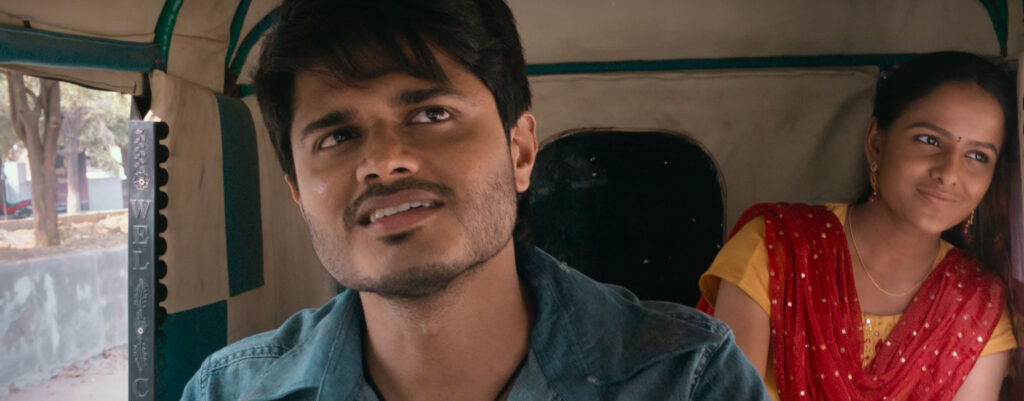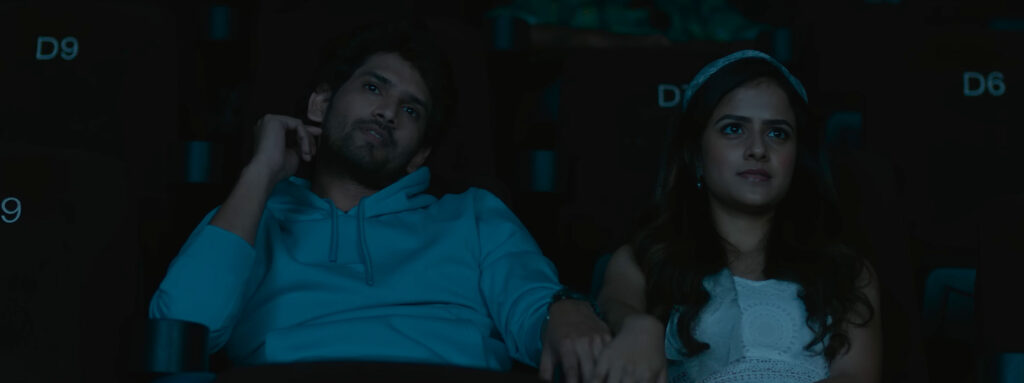July 15, 2023
by Carla Hay

Directed by Sai Rajesh Neelam
Telugu with subtitles
Culture Representation: Taking place mostly in unnamed cities in India, the dramatic film “Baby” features a mostly Indian cast of characters (with a few white people) representing the working-class, middle-class and wealthy.
Culture Clash: Working-class teenage sweethearts have their relationship tested when she goes away to college and is courted by a wealthy suitor, who is a fellow student.
Culture Audience: “Baby” will appeal primarily to people who don’t mind watching a movie that’s a tacky soap opera.

“Baby” is an awful and bloated melodrama on every single level. This pathetic excuse for a romantic film has misogyny and abuse against women as acceptable ways for men to treat women as people to “own” and manipulate, not as people to truly love. The movie is on an often-boring loop of makeups and breakups that drag on for far too long in this nearly three-hour film.
Written and directed by Sai Rajesh Neelam, “Baby” takes place over a period of about five to eight years, in unnamed cities in India. The movie opens by showing a man in his 20s named Anand (played by Anand Devarakonda), waking up and vomiting on a street, after he passed out from ingesting unknown drugs. He’s dirty and disheveled. Anand works as a mini-cab driver, and he has a reputation for frequently being a drug abuser who often passes out in public.
Anand has woken up from this stupor after dreaming of his teenage sweetheart Vaishnavi, nicknamed Vaishu (played by Vaishnavi Chaitanya), whom he liked to affectionately call “baby.” The rest of the movie then goes into flashback mode until the last 15 minutes, to show what happened during the relationship of Anand and Vaishnavi, who both grew up in the same working-class neighborhood but didn’t start dating each other until their last year in high school.
“Baby” is a very corny movie in too many ways to count. Vaishnavi first gets Anand’s attention by throwing a pebble at him from her window while he was outside on the street. They make googly eyes at each other and do some mild flirting with each other. Vaishnavi is a stereotypical virginal “good girl” who is very sheltered, while Anand has had a bit of a rougher life. The turning point in their relationship happens after a disturbing abuse incident that happened to Vaishnavi at their school.
Anand and Vaishnavi have the same mathematics class together. One day, their male teacher gets angry at Vaishnavi for not knowing the answer to a math problem. The teacher starts yelling at Vaishnavi and then slapping her hands very hard with a ruler. Vaishnavi and the other students do nothing to stop this abuse and don’t report this crime, because they’re in a culture where teachers are apparently allowed to abuse their students in this way.
After the class ends, a humiliated Vaishnavi is walking outside with her best friend Kusuma (played by Kusuma Degalamari), when Anand joins them. Anand picks up one of Vaishnavi’s bruised hands and asks her, “Will you let me love you?” She shyly says yes. And so begins the up-and-down romance of Anand and Vaishnavi.
After graduating from high school, Vaishnavi plans to go to college, while Anand plans to stay in their hometown and work full-time as a mini-cab driver. He owns his own mini-cab and has been doing this work part-time while in high school. The college that Vaishnavi is going to is far from her hometown but not too far away for Anand to visit several times a month. Vaishnavi does not have a driver’s license.
Anand is very insecure about whether or not their relationship can last when it’s a long-distance relationship. Vaishnavi assures him that their love can withstand this test. Anand is also insecure about his family background and his low income. Vaishnavi comes from a loving home with two married parents (played by Nagendra Babu and Lirisha Kunapareddy), who don’t have names in the movie. Anand describes his home life to Vaishnavi this way: “My father died when I was young. My mother is dumb. I have no money.”
Anand’s mother (played by Prabhavati Varma), who doesn’t have a name in the movie, actually isn’t “dumb.” As later shown in “Baby,” she’s a concerned and compassionate mother who’s a little overprotective, but she means well. In a scene that happens in the movie, Anand’s mother finds out that Anand is having financial problems, so she generously gives him some cash, even though he didn’t ask for it. In response, Anand shouts at her that he doesn’t need her help, and throws the wad of cash on the ground.
Anand’s disdainful attitude toward his mother is one of many examples of how all the principal male characters in this movie are misogynistic. Vaishnavi becomes part of a love triangle, but what’s shown in this movie is not real love, even though the filmmakers are trying to make “Baby” look like an epic romantic story. What this movie is all about is Vaishnavi being treated as a pawn between two men in a battle of their egos.
The trouble in Vaishnavi and Anand’s relationship doesn’t happen right away. At first, Vaishnavi and Anand adjust to her being away at college, because she’s followed Anand’s orders not to drink alcohol, especially when she’s at a nightclub or bar. Anand warns Vaishnavi that if she gets tipsy or drunk, men will take advantage of her and she might get raped. Although it’s a valid concern, it’s very domineering and sexist how Anand dictates to Vaishnavi what she can and can’t do to be a “proper lady.”
As soon as Vaishnavi is told that she shouldn’t get drunk in nightclubs, you just know it’s eventually going to happen. During her first day at college, a popular student named Seetha (played by Kirrak Seetha) introduces herself to Vaishnavi and tells her that they will be friends. Seetha, who hangs out with a crowd of other student partiers, is determined to “loosen up” Vaishnavi, because she thinks Vaishnavi is too prim and uptight.
Seetha and her friends like to get drunk, smoke (tobacco and marijuana) and do other drugs. Vaishnavi politely declines when she’s offered any drugs, but she finally relents (after much pestering from Seetha) and smokes tobacco for the first time through a hookah. Eventually, Vaishnavi starts drinking alcohol too.
At Seetha’s insistence, Vaishnavi lets Seetha pay for Vaishnavi to get a full “glamorous” makeover. After the makeover, Vaishnavi starts wearing makeup and wearing her long hair unrestrained, after previously wearing her hair pinned-back or in braids. Vaishnavi’s wardrobe also changes from being plain and modest to more daring and revealing.
Anand dislikes Vaishnavi’s makeover. He gets so angry about it, they have an argument where he pushes her hard and calls her a “whore.” Anand is later apologetic, and Vaishnavi forgives him. But it won’t be the last time that Anand has an abusive outburst against Vaishnavi. She’s reluctant to break up with him because Vaishnavi thinks Anand is her “one true love.”
Vaishnavi’s outward transformation is immediately noticed by a rich and arrogant student at the school named Viraj Ashwin (played by Viraj Ashwin), who was already attracted to Vaishnavi before her makeover. After her makeover, he becomes even more attracted to her. Viraj begins aggressively courting Vaishnavi, even though he knows that Anand is her hometown boyfriend. Viraj is the type of person who thinks he can buy someone’s love.
The rest of “Baby” has many scenes, dialogue and acting that are absolutely cringeworthy. Shortly after Vaishnavi began attending college, Anand gave an Android phone to Vaishnavi as a gift, so that they can keep in touch. He also gave himself a matching Android phone. Vaishnavi is grateful but also annoyed that Anand got himself a matching phone. She tells him that the gift isn’t as special because he bought himself a phone too.
Meanwhile, Viraj notices that Vaishnavi is using an Android phone that she tells him was given to her by Anand. It isn’t long before Viraj constantly tells Vaishnavi that she should have an iPhone. Viraj says to Vaishnavi: “Beautiful girls should have beautiful phones.” Viraj compares an iPhone to beauty so much in this horrible movie, it starts to look like shameless iPhone product placement.
And sure enough, Viraj eventually gives an iPhone to Vaishnavi, who starts using the iPhone (because it has more features) than the Android phone that Anand gave to her. Anand inevitably finds out and get jealous. More arguments ensue between Anand and Vaishnavi. Suddenly, Viraj is starting to look attractive to Vaishnavi, even though she’s not in love with Viraj.
“Baby” has some very weird and unbelievable moments that make no sense at all. For example, Viraj throws a big party at a nightclub, where he announces in front of everyone that he’s in love with Vaishnavi, even though he and Vaishnavi barely know each other, and they’ve never been on any official “dates.” At the same party, there’s also a scene where drunk Vaishnavi kisses Viraj out in the open at a table near the dance floor, where dozens of people can see them, but then she makes Vaishnavi promise not to tell anyone that they kissed.
“Baby” continues to sink into a tawdry cesspool of bad performances and even worse storylines while showing a lot of abuse and mistrust masquerading as “love.” There’s a subplot about sexual blackmail that is absolutely pathetic. Considering all the misogyny in this junkpile movie, it’s easy to know who is the target of this blackmail. People who think “Baby” is a good movie need to check their attitudes about women and girls, because those attitudes are probably sexist and outdated.
Mass Movie Makers released “Baby” in select U.S. cinemas and in India on July 14, 2023.
